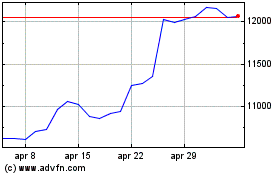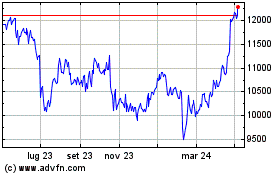AstraZeneca Warns of Covid-19 Vaccine Shortfall in Europe
22 Gennaio 2021 - 9:20PM
Dow Jones News
By Jenny Strasburg
LONDON -- AstraZeneca PLC told European Union officials that
fewer doses of its Covid-19 vaccine will be ready for the bloc's
planned rollout in early February, blaming an unspecified
manufacturing issue.
The shortfall comes as European leaders face heightened scrutiny
over what critics say has been a slower rollout of several
Western-developed vaccines than in the U.S. and U.K. It also comes
after European officials clashed this week with Pfizer Inc. and
BioNTech SE over the companies' decision to cut their own planned
deliveries of Covid-19 vaccines to the bloc.
The dual shortfalls put the Continent's plans to accelerate its
vaccine drive at risk. EU nations have placed big orders for the
AstraZeneca shot, partly because it doesn't require the cold
storage needed for the Pfizer-BioNTech vaccine. Officials have been
banking on the arrival of their AstraZeneca orders next month to
speed up bloc-wide vaccinations.
The AstraZeneca disclosure also threatens a fresh reputational
hit to the British pharmaceutical giant, which partnered with the
University of Oxford in developing the vaccine. AstraZeneca is
responsible for manufacturing and distribution of the vaccine, as
well as regulatory approvals.
The company has previously faced criticism over how it initially
communicated results of the vaccine's late-stage human trials.
Austria's health-care minister Rudolf Anschober said that
AstraZeneca's move was unacceptable. The company's commitments to
delivery "must be honored," Mr. Anschober said Friday. A spokesman
for the European Commission said that AstraZeneca confirmed a
"change of its delivery schedule" and that the commission was
working to find out more details.
AstraZeneca said it would still be able to start delivering
vaccines upon anticipated approval of the shot in Europe, a
spokesman said Friday evening. The European Medicines Agency is
scheduled to review the AstraZeneca vaccine next week. If approved,
the vaccine could start rolling out in early February.
An AstraZeneca spokesman said Friday, however, that "initial
volumes will be lower than originally anticipated." He declined to
specify the size of the shortfall or the reason, except to say it
was because of "reduced yields" at a manufacturing site in the
company's European supply chain.
He said AstraZeneca still expects to ship tens of millions of
doses to the EU in February and March as it ramps up production
volumes.
The AstraZeneca-Oxford vaccine hasn't been approved yet in the
U.S. It was first administered in the U.K. starting in early
January and has since been authorized in a handful of other
countries, including India.
A number of top drug regulators are set to issue recommendations
on the AstraZeneca vaccine around the same time. The EU's regulator
will reach a judgment on Jan. 29. Switzerland is set to issue its
own decision on the vaccine that same week. The World Health
Organization said Friday it would announce its own judgment on
whether to authorize the vaccine within the next three weeks.
Last week, Canadian Health Minister Patty Hajdu said the
country's national health department would make a decision on the
AstraZeneca vaccine in the near future.
Write to Jenny Strasburg at jenny.strasburg@wsj.com
(END) Dow Jones Newswires
January 22, 2021 15:05 ET (20:05 GMT)
Copyright (c) 2021 Dow Jones & Company, Inc.
Grafico Azioni Astrazeneca (LSE:AZN)
Storico
Da Mar 2024 a Apr 2024

Grafico Azioni Astrazeneca (LSE:AZN)
Storico
Da Apr 2023 a Apr 2024
